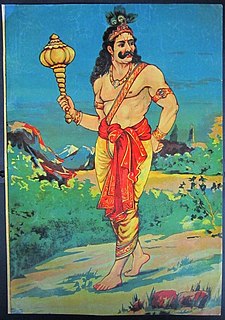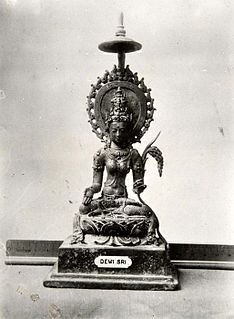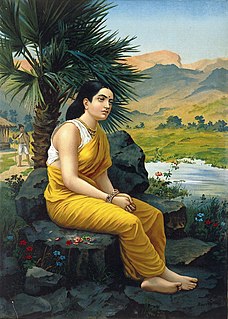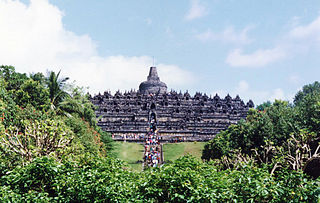Related Research Articles

Arjuna, also known as Partha and Dhananjaya, is one of the major characters of the Indian epic Mahabharata and also appears in other ancient Hindu texts including the Bhagavata Purana. In the epic, he is the third among Pandavas, the five sons of Pandu. The family formed part of the royal line of the Kuru Kingdom. In the Mahabharata War, Arjuna was a key warrior from the Pandava side and slew many warriors including Karna. Before the beginning of the war, his mentor, Krishna, gave him the supreme knowledge of Bhagavad Gita to overcome his moral dilemmas.

In Hindu epic Mahabharata, Bhima is the second among the five Pandavas. The Mahabharata relates many events that portray the might of Bhima. He is one of the primary antagonists of Karna but always was defeated when a combat between the two took place. Bhima was born when Vayu, the wind god, granted a son to Kunti and Pandu. After the death of Pandu and Madri, Kunti with her sons stayed in Hastinapura. From his childhood, Bhima had a rivalry with his cousins Kauravas, especially Duryodhana. Duryodhana and his uncle, Shakuni, tried to kill Bhima multiple times. One was by poisoning and throwing Bhima into a river. Bhima was rescued by Nāgas and was given a drink which made him very strong and immune to all venom.

Abhimanyu is a legendary warrior from the ancient Hindu epic Mahabharata. He was born to the third Pandava prince Arjuna and Yadava princess Subhadra, who was also Krishna's sister. He is believed to be an incarnation of Varchas, son of Chandra. Abhimanyu was raised by his maternal relatives as his father Arjuna, along with his 4 brothers and wife, was sent into Vanvas for 13 years. After his father's return Abhimanyu married Uttarā, the princess of Matsya. During the Kurukshetra War, Abhimanyu fought by his father's side. On the thirteenth day of the war, the mightiest Kaurava warriors came together and formed the Chakravyuha, the young Abhimanyu was able to penetrate it, but could never make his way out, and was slain inside it, fighting them all alone. His son, Parikshit, was the one who saved the lineage from extinction and went onto become a legendary king.

Kakawin Ramayana is an Old Javanese poem rendering of the Sanskrit Ramayana in kakawin meter.

Puteri Gunung Ledang is a 2004 Malaysian epic fantasy period film directed by Saw Teong Hin. The film is based on the Malay legend of the Gunung Ledang princess, who is said to have lived on top of Gunung Ledang, and a Malaccan sultan's effort to court her. The film stars Tiara Jacquelina, M. Nasir and Adlin Aman Ramlie.

Bharatayuddha or Bharat Yudha is a term used in Indonesia for the Kurukshetra War, and to describe the Javanese translation and interpretation of the Mahabharata. The Mahabharata was translated into (old) Javanese under the reign of king Dharmawangsa of Medang. The current poem was started by Sedah in 1157, and finished by mpu Panuluh. Mpu Panuluh also wrote the Kakawin Hariwangsa.

Sita is a Hindu goddess and the heroine of the Hindu epic, Ramayana, and its other versions. She is described as the daughter of Bhūmi and the adopted daughter of King Janaka of Videha and his wife, Queen Sunayana. She has a younger sister, Urmila, and two female cousins Mandavi and Shrutakirti. Sita is known for her dedication, self-sacrifice, courage, and purity.

The Dancing Water, the Singing Apple, and the Speaking Bird is a Sicilian fairy tale collected by Giuseppe Pitrè, and translated by Thomas Frederick Crane for his Italian Popular Tales. Joseph Jacobs included a reconstruction of the story in his European Folk and Fairy Tales. The original title is "Li Figghi di lu Cavuliciddaru", for which Crane gives a literal translation of "The Herb-gatherer's Daughters."
"The Pig King" or "King Pig" is an Italian literary fairy tale written by Giovanni Francesco Straparola in his The Facetious Nights of Straparola. Madame d'Aulnoy wrote a French, also literary, variant, titled Prince Marcassin.

The Wali Songo are revered saints of Islam in Indonesia, especially on the island of Java, because of their historic role in the Spread of Islam in Indonesia. The word wali is Arabic for "trusted one" or "friend of God", while the word sanga is Javanese for group of monks or the number nine. Thus, the term is often translated as "Sangha of saints".
"The Pretty Little Calf" is a Chinese fairy tale collected by Wolfram Eberhard in "Folktales of China".

The Panji tales are a cycle of Javanese stories, centred around the legendary prince of the same name from East Java, Indonesia. Along with the Ramayana and Mahabharata, the tales are the basis of various poems and a genre of wayang known in East Java as wayang gedhog. Panji tales have been the inspiration of Indonesian traditional dances, most notably the topeng (mask) dances of Cirebon and Malang, as well as gambuh dance-drama in Bali. Especially in the environs of Kediri, the suggested homeland of the tales of Panji, local stories grew and were connected with the obscure legendary figure of Totok Kerot. Panji tales have spread from East Java (Indonesia) to be a fertile source for literature and drama throughout Indochina Peninsula and Malay World as well.
Ciung Wanara is a legend among Sundanese people, Indonesia. The folklore tell the legend of Sunda Galuh kingdom, the origin of Pamali River's name as well as describe the cultural ties between Sundanese and Javanese living in western part of Central Java province.
Sangkuriang is a legend among Sundanese people in Indonesia. The legend tells about the creation of Lake Bandung, Mount Tangkuban Parahu, Mount Burangrang and Mount Bukit Tunggul. The legend of Sangkuriang tells the story of a young man who falls in love with his own mother, which is somewhat comparable to the Greek tragedy Oedipus.

Dewi Sri or Shridevi, Dewi Sri) is the Javanese, Sundanese, and Balinese Hindu Goddess of rice and fertility, still widely worshiped on the islands of Java, Bali and Lombok, Indonesia.

The mythology of Indonesia is very diverse, the Indonesian people consisting of hundreds of ethnic groups, each with their own myths and legends that explain the origin of their people, the tales of their ancestors and the demons or deities in their belief systems. The tendency to syncretize by overlying older traditions with newer foreign ideas has occurred. For example, the older ancestral mythology might be merged with foreign mythology, such as Hindu, Islam, or Christian biblical mythology.

Besides eight principal queens (Ashtabharya), the Hindu god Krishna, an avatar of the god Vishnu and the king of Dwarka, gave the position of the queen to some women their number is mentioned as 16,000 or 16,100 in different scriptures.

King Lindworm or Prince Lindworm is a Danish fairy tale published in the 19th century by Danish folklorist Svend Grundtvig.

The Sea Tsar and Vasilisa the Wise is a Russian fairy tale published by author Alexander Afanasyev in his collection of Russian Fairy Tales, numbered 219. The tale features legendary characters Tsar Morskoi and Vasilisa the Wise.

The Boy with a Moon on his Forehead is a Bengali folktale collected by Maive Stokes and Lal Behari Day.
References
- ↑ Putten, Jan van der; Cody, Mary Kilcline (2009). Lost Times and Untold Tales from the Malay World. NUS Press. ISBN 978-9971-69-454-8. pp. 7-10
- ↑ Kumar, Ann (1997). Java and Modern Europe: Ambiguous Encounters. pp. 144–147. ISBN 9781136790850.
- ↑ Lessa, William A. “Oedipus-Type Tales in Oceania.” The Journal of American Folklore, 69, no. 271 (1956), pp. 63–73, and note 3. https://doi.org/10.2307/536945.